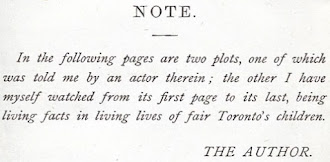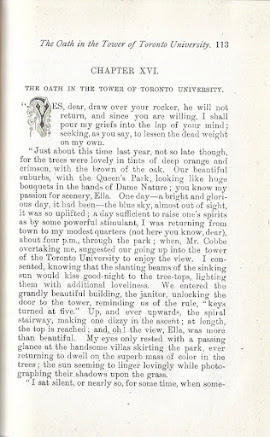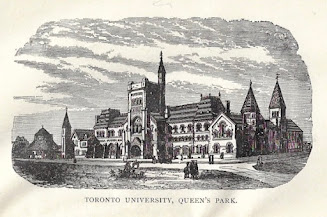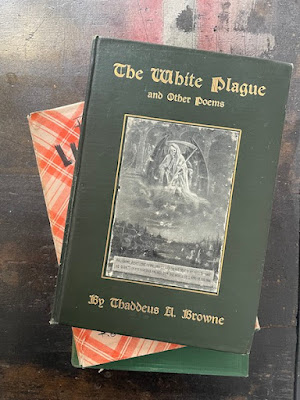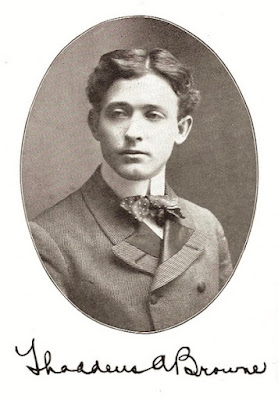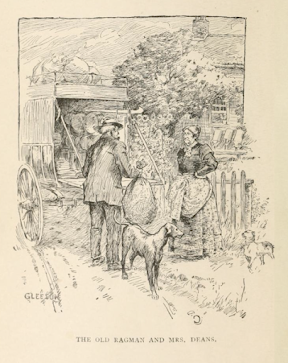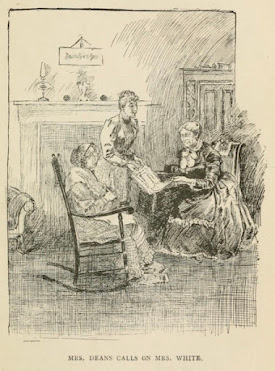Toronto: Briggs, 1913
294 pages
The cover has it that Looking Forward is "A NOVEL FOR THE TIMES," which it most certainly was, but only to those of certain Canadian Christian denominations. The proposed union of the country's Presbyterian, Methodist, and Congregationalist churches, then a matter of considerable debate, is its impetus. Discussions of sacerdotalism and the episcopate do feature.
Before the eyes glaze over, I rush to add that Looking Forward is also a work of science fiction, imaging a Canada in which hydroplane racing is a popular sport and airships like the Winnipeg Express whisk passengers from Montreal to the Manitoba capitol in under thirty-six hours.
As the subtitle suggests, the novel's hero is Fergus McCheyne. The only son of Presbyterian pastor Rev Robert McCheyne, the young man was born and raised in Cairntable, his father's rural parish, located somewhere in easternmost Ontario (read: Glengarry County). There he was molded by his parents' faith and condemnation of everything not Presbyterian. |
| Old McGill, 1900 |
Fergus does his best to hide his interest in Florence, but a mother knows:
“The Methodist minister’s daughter! Oh, Fergie, what would you be doing with the likes of her? You know how your father feels, and how I feel, about these Methodists. What have we in common with them? They are all wrong in their doctrines, and what little religion they have is all sentiment and shouting.”
For his experiments he managed to smuggle in mice, kittens, and little dogs. He found it much easier to smuggle them out.
 |
| Two old books by Montreal authors, 31 May 2025. |
Being a gentleman of propriety, Falconer hands the letter to Rev Manthorpe's surviving brother, who in turn shares its incredible contents. The very next morning, the two men set off for the cavern in the company of Mackenzie, a medical doctor who had been another of Fergus's friends. They expect the worst, of course, but are not so fatalistic that they don't carry a capsule containing the restorative mixture.
 |
| Frontispiece |
Whatever opinion may be held of Bellamy’s views, no one can doubt the efficacy of his method in bringing these views to the notice of the world. To be sure, my dream is on a much narrower scale, and with a far less ambitious reach than his. That took in the entire sphere of human life; mine has to do with but a segment of that sphere. That contemplated a perfect social order; mine is content with an improved ecclesiastical situation. That beheld a new heaven and a new earth; mine looks for a Canada made better because a little more of heaven has entered into its life.The 1927 Canada encountered by Fergus is indeed better. Poverty has been eradicated and the roads are paved with pavement:
- By this time they had turned out of the main traffic thoroughfare into a smooth-paved and absolutely dustless road... (p 124)
- With amazement he looked upon miles of paved street... (p 126)
- The locality was not unknown to McCheyne, and he remembered what it used to be – the ill-paved streets... (p 138)
- On the outskirts of Montreal, but closely knitted to it by well-paved roads... (p 154)
- Park, and drive, and terrace, well-paved streets lined with trees... (p 156)
- And it looks as if there are well-paved streets. (p 190)
Looking Forward is indeed less ambitious than Looking Backward. Rev Pedley's imagination, despite its focus, is not nearly so rich and his prose makes for painful reading. This passage takes place not on the Winnipeg Express but in the engine room of the Saskatchewan, another airship, where Fergus encounters a man named Dennis Mulcavey:
“I knew a man of that name. He was foreman for the Sands Company.”“Sure, sorr, it’s a foine mimory ye hev. That was my father, and he’s been did these twinty years.”“Yes,” said McCheyne, somewhat idiotically, "have a fine memory, for I do remember your father.”“It’s wonderful,” said the other, “but they tell me he was a foine man, and a smarrt wan, too.”“Yes, a very smart one.”The talk then turned upon the airship, the working of the engines, the liability to accident, and the time they were making on their trip, in all of which topics McCheyne took a deep interest, and won the respect of the men by the intelligent way in which he received their information.
“But I have heard that twenty-five years ago you felt like this towards my mother.”“Yes, exactly like this.”“So it is because you see my mother in me that you say you love me?”"Yes,” was the direct, honest reply.“Then,” said she, all lightness thrown aside and speaking in tones that trembled with emotion, “I am honoured beyond measure by such a love.”
I found this disturbing.
My wife is more dismissive: "It's written by a man."
McCheyne stretches out his hand, which is at once enclosed in a firm and friendly clasp. Then the eyes of the two men meet... and Fergus is conscious of the only pang that has marred this crowning day. As he looks into the young priest’s eyes he feels as if gazing one moment upon a parterre of flowers, there has the next moment been the sudden opening of a cleft, and he is looking down into a profound abyss where ice and fire are strangely intermingled; and he knows that he has had a momentary glimpse of the age-long mystery of the ecclesiastically ordained celibate life.A strange thing to include in an otherwise joyous and happy final scene, though it did serve to remind that Fergus's experiments and long hibernation would never have taken place had only his parents been willing to accept a Methodist as a daughter-in-law.
More on Looking Forward a week this Tuesday, the one hundredth anniversary of the United Church of Canada.
 |
| The Sherbrooke Daily Record, 4 September 1953 |
Move quickly! The three others range in price between US$79.95 and US$150.00.














